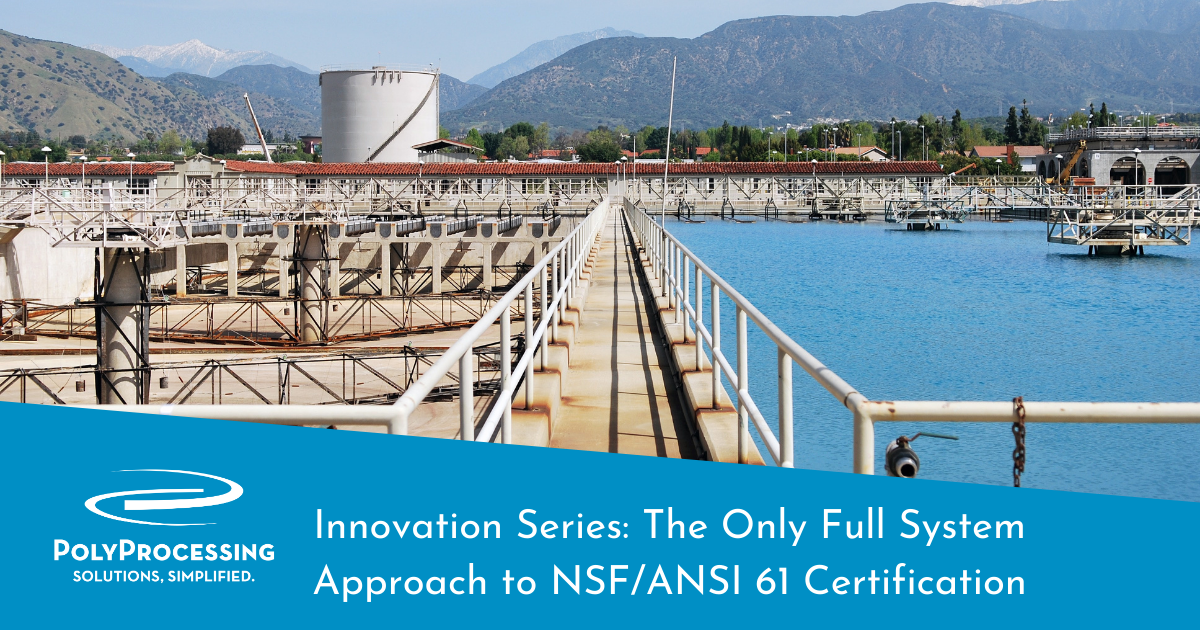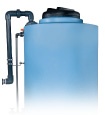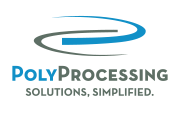Poly Processing Innovation Series: The Only Full System Approach to NSF/ANSI 61 Certification
This is the third article in Poly Processing’s Innovation Series, where you’ll discover the many innovations that we have introduced to the chemical storage industry.

If you manufacture, sell or distribute water treatment or distribution products in North America, your products typically must comply with NSF/ANSI 61. NSF/ANSI 61 sets the criteria for water system components to protect health standards. It’s important that all components in water treatment meet the correct standards to ensure dangerous toxins aren’t leached.
However, there is confusion about NSF-61 certifications, and that confusion could lead to purchasing the wrong product for your application. Let’s explore NSF/ANSI 61 and how to make sure your chemical storage tank system meets the necessary requirements.
What Is NSF/ANSI Standard 61?
NSF/ANSI 61 is a set of national standards that relates to water treatment. It establishes stringent requirements for the control of equipment that comes into contact with either potable water or products that support the production of potable water. The tests vary from a basic cold water test at different pH levels to the more challenging chemical certification.
NSF-61 was developed by the National Sanitation Foundation (NSF), a global independent public health and environmental organization, and the American National Standards Institute (ANSI), which oversees the consensus for developing standards for manufacturing and procedures in the United States.
How Does NSF Test Tanks and Accessories?
A liquid is tested before and after exposure to a given piece of equipment to determine whether anything has been leached out or extracted from the equipment. Many manufacturers test pH 5, pH 8 and pH 10 exposure water at ambient temperature. That’s sufficient for potable water storage, but those tests can’t account for potential leaching in chemical storage tanks. Chemical storage systems require more stringent testing.
For chemical tests, NSF exposes the tanks to chemicals certified to NSF/ANSI 60. The tanks undergo an exposure period dictated by the NSF/ANSI 61. Once the exposure time is completed, the chemical that was exposed to the tank material is analyzed for the presence of chemical compounds that may have leached from the tank itself. If there are no detectable leachants or the leachants are below the pass/fail criteria, then the tank passes the test.
This testing is performed on the most aggressive chemicals that may be stored in the tank.
How Do I Know if My System Is Certified?
There are various levels of certification that a chemical storage system can achieve. This variance can make certification confusing, and some manufacturers incorrectly explain the certification levels of their products.
In fact, some products listed as NSF-61 may only apply to potable water and not to chemical storage or vice versa. As a result, you could end up buying the wrong product for your application.
To independently confirm that a product meets the correct standards for your application, visit the NSF website for a complete list of components by manufacturer. You’ll see a list of chemicals that the components are certified for. Next to the chemical name is a percentage that denotes the concentration the product is certified for. For example, you may see a storage tank with sulfuric acid ≤ 98%, which means that the tank is certified to store up to a 98% concentration of sulfuric acid.
It’s also important to know the difference between a tank certification and a system certification. If your tank is certified but the fittings and accessories on the tank are not, then your chemical storage system is not NSF-61 certified.
A full system certification includes even small parts like gaskets and fittings, which must also be tested. When selecting equipment, it’s very important to make sure all materials meet NSF-61 standards for potable water or chemical storage — even the smallest parts of your system.
The Only Full-System Approach to NSF Approval
Manufacturers may have certified tanks, but their fittings and gaskets may not be NSF/ANSI certified. Poly Processing is the only chemical storage tank manufacturer to take a full system approach to NSF approval. We supply an entire tank system, including fittings, gaskets, expansion joints, and specific tank colors, that are certified for NSF/ANSI 61.
Currently, we have NSF-61 Certification for 38 of the most popular water treatment chemicals on our XLPE tank systems. Additionally, our certifications cover XLPE tanks and XLPE tank with the OR-1000™ system, our engineered antioxidant barrier. Poly tanks are certified for both potable water and chemical storage.
Get the Facts About NSF Certification
NSF/ANSI 61 certification can be confusing. Make sure you have all the facts you need before purchasing your chemical storage system. Download our NSF/ANSI 61 Certification eBook to learn more about NSF certification for potable water storage vs. chemical storage.
- November 11, 2024
- Topics: Value Added
About Poly Processing
Posts By Topic
Tech Talk Podcast Episodes
Subscribe By Email
Recent Posts
- Installation Tips for Chemical Storage Tanks: Site Preparation and Offloading
- Understanding pH and Chemical Concentration When Choosing a Chemical Tank
- Maximizing Fill Efficiency: Selecting the Optimal Fill Line System
- Chemical Storage Tanks: A Quick Guide for End Users
- Popular Customization Options for Chemical Storage Tanks
Tank Configurator

Find the recommended tank and system components for your chemical storage challenge.
Configure a Tank Package








